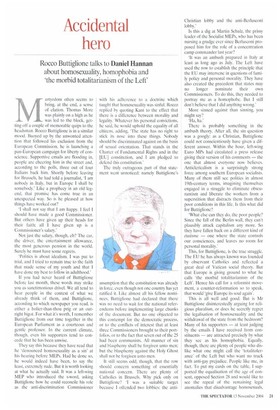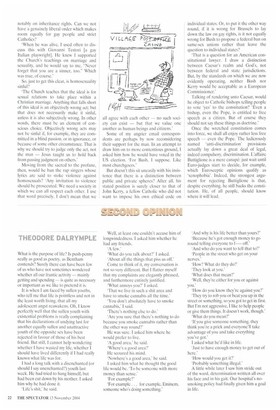Accidental hero
Rocco Buttiglione talks to Daniel Hannan about homosexuality, homophobia and 'the morbid totalitarianism of the Left' Martyrdorn often seems to bring, at the end, a sense of elation. Thomas More was plainly on a high as he was led to the block, getting off a couple of memorable quips to the headsman. Rocco Buttiglione is in a similar mood. Buoyed up by the unwonted attention that followed his exclusion from the European Commission, he is launching a pan-European campaign for liberty of conscience. Supportive emails are flooding in, people are cheering him in the street and, according to the polls, three out of four Italians back him. Shortly before leaving for Brussels, he had told a journalist, 'I am nobody in Italy, but in Europe I shall be somebody.' Like a prophecy in an old legend, that promise has come true in an unexpected way. So is he pleased at how things have worked out?
1 shall not say that I am happy. I feel I should have made a good Commissioner. But others have given up their heads for their faith; all I have given up is a Commissioner's salary.'
Not just the salary, though, eh? The car, the driver, the entertainment allowance, the most generous pension in the world. Surely he must have some regrets.
'Politics is about idealism. I was put to trial, and I tried to remain true to the faith that made sense of my youth and that I have done my best to follow in adulthood.'
If you had never heard of Buttiglione before last month, these words may strike you as sanctimonious drivel. We all tend to hear people in the context of what we already think of them, and Buttiglione, according to which newspaper you read, is either a holier-than-thou prig or an outright bigot. For what it's worth, I remember Buttiglione from our time together in the European Parliament as a courteous and gentle professor. In the current climate, though, even his supporters tend to concede that lie has been unwise.
They say this because they have read that he 'denounced homosexuality as a sin' at his hearing before MEPs. Had he done so, he would indeed have been, to say the least, extremely rude. But it is worth looking at what he actually said. It was a left-wing MEP who introduced the s-word, asking Suinglione how he could reconcile his role as the anti-discrimination Commissioner with his adherence to a doctrine which taught that homosexuality was sinful. Rocco replied by quoting Kant to the effect that there is a difference between morality and legality. Whatever his personal convictions, he said, he would uphold the equality of all citizens, adding, 'The state has no right to stick its nose into these things. Nobody should be discriminated against on the basis of sexual orientation, That stands in the Charter of Fundamental Rights and in the [Eli] constitution, and I am pledged to defend this constitution.'
The truly outrageous part of that statement went unnoticed: namely Buttiglione's assumption that the constitution was already in force, even though not one country has yet ratified it. Like almost all his fellow nominees, Buttiglione had declared that there was no need to wait for the national referendums before implementing large chunks of the document. But no one objected to this contempt for the democratic process, or to the conflicts of interest that at least three Commissioners brought to their portfolios, or to the fact that seven out of the 25 had been communists. All manner of sin and blasphemy shall be forgiven unto men; but the blasphemy against the Holy Ghost shall not be forgiven unto men.
It still seems odd, though, that the row should concern something of essentially national concern. There are plenty of Catholics in Brussels. Why pick only on Buttiglione? 1 was a suitable target because I offended two lobbies: the anti Christian lobby and the anti-Berlusconi lobby.'
Is this a dig at Martin Schulz, the prissy leader of the Socialist MEPs, who has been nursing a grudge ever since Berlusconi proposed him for the role of a concentration camp commander last year?
It was an ambush prepared in Italy at least as long ago as July. The Left have used the row to establish the principle that the EU may intervene in questions of family policy and personal morality. They have also created the precedent that states may no longer nominate their own Commissioners. To do this, they needed to portray me as a homophobe. But I still don't believe that I did anything wrong.'
More sinned against than sinning, you might say?
'Ha, ha.'
There is probably something in the ambush theory. After all, the sin question was a googly: as a Christian, Buttiglione could not conscientiously have given a different answer. Within the hour, left-wing Euro MPs had circulated a press release giving their version of his comments — the one that almost everyone now believes. Anticlericalism is a surprisingly strong force among southern European socialists. Many of them still see politics in almost 19th-century terms, imagining themselves engaged in a struggle to eliminate obscurantism and liberate the workers from a superstition that distracts them from their poor conditions in this life. Is this what did for Buttiglione?
'What else can they do, the poor people'? Since the fall of the Berlin wall, they can't plausibly attack capitalism any more. So they have fallen back on a different kind of etaiisme — one where the state controls our consciences, and leaves no room for personal morality.'
This, for Buttiglione, is the true struggle. The EU he has always known was founded by observant Catholics and reflected a great deal of Vatican social theory. But that Europe is giving ground to what he calls 'the morbid totalitarianism of the Left'. Hence his call for a reformist movement, a counter-reformation so to speak, that would 'give Europe its soul again'.
This is all well and good. But is Mr Buttiglione disinterestedly arguing for religious pluralism, or does he secretly regret the legalisation of homosexuality and the withdrawal of the state from the bedroom? Many of his supporters — at least judging by the emails I have received from constituents — are attracted precisely by what they see as his homophobia. Equally, though, there are plenty of people who dislike what one might call the lotalitolermice' of the Left but who want no truck with anti-gay prejudice. People like me, in fact. To put my cards on the table, I supported the equalisation of the age of consent, opposed Section 28 and would like to see the repeal of the remaining legal anomalies that disadvantage homosexuals,
notably on inheritance rights. Can we not have a genuinely liberal order which makes room equally for gay people and strict Catholics?
'When he was alive, I used often to discuss this with Giovanni Testori [a gay Italian playwright]. He knew I supported the Church's teachings on marriage and sexuality, and he would say to me, "Never forget that you are a sinner, too." Which was true, of course.'
So, just to get this clear, is homosexuality sinful?
The Church teaches that the ideal is for sexual relations to take place within a Christian marriage. Anything that falls short of this ideal is an objectively wrong act; but that does not necessarily make it sinful, unless it is also subjectively wrong. In other words, there must be an element of conscious choice. Objectively wrong acts may not be sinful if, for example, they are committed in a blind passion, or in ignorance, or because of some other circumstance. That is why we should try to judge only the act, not the man — Jesus taught us to hold back from passing judgment on others.'
Moving from the sacred to the profane, then, would he ban the rap singers whose lyrics are said to stoke violence against homosexuals? Any invitation to violence should be prosecuted. We need a society in which we can all respect each other. I use that word precisely. I don't mean that we all agree with each other — no such society can exist — but that we value one another as human beings and citizens.'
Some of my angrier email correspondents are perhaps by now reconsidering their support for the man. In an attempt to draw him on to more contentious ground, I asked him how he would have voted in the US election. Tor Bush, I suppose. Like most churchgoers.'
But doesn't this sit uneasily with his insistence that there is a distinction between public and private spheres? After all, his stated position is surely closer to that of John Kerry, a fellow Catholic who did not want to impose his own ethical code on individual states. Or, to put it the other way round, if it is wrong for Brussels to lay down the law on gay rights, is it not equally wrong for Bush to propose a federal ban on same-sex unions rather than leave the question to individual states?
That is a question for an American constitutional lawyer. I draw a distinction between Caesar's realm and God's, not between federal and state jurisdictions. But, by the standards on which we are now evidently operating, neither Bush nor Kerry would be acceptable as a European Commissioner.'
Talking of rendering unto Caesar, would he object to Catholic bishops telling people to vote 'yes' to the constitution? 'Even a bishop, even the Pope, is entitled to free speech as a citizen. But of course they should not say these things as doctrine.'
Once the wretched constitution comes into force, we shall all enjoy rather less free speech — even the Pope. The ludicrously named 'anti-discrimination' provisions actually lay down a great deal of legal, indeed compulsory, discrimination. L'affaire Buttiglione is a mere canapé: just wait until Euro-judges start to decide, for example, which Eurosceptic opinions qualify as 'xenophobia'. Indeed, the strongest argument for rejecting Buttiglione is that, despite everything, he still backs the constitution. He, of all people, should know where it will lead.



























































































 Previous page
Previous page